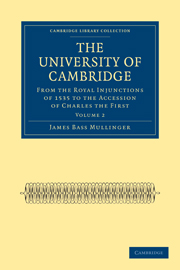Book contents
- Frontmatter
- PREFACE
- Contents
- ABBREVIATIONS, ETC.
- INTRODUCTION
- CHAP. I COMMENCEMENT OF THE UNIVERSITY ERA
- CHAP. II RISE OF THE ENGLISH UNIVERSITIES
- CHAP. III CAMBRIDGE PRIOR TO THE CLASSICAL ERA
- CHAP. IV STUDENT LIFE IN THE MIDDLE AGES
- CHAP. V CAMBRIDGE AT THE REVIVAL OF CLASSICAL LEARNING
- CHAP. VI CAMBRIDGE AT THE REFORMATION
- APPENDIX
- INDEX
CHAP. VI - CAMBRIDGE AT THE REFORMATION
Published online by Cambridge University Press: 07 September 2010
- Frontmatter
- PREFACE
- Contents
- ABBREVIATIONS, ETC.
- INTRODUCTION
- CHAP. I COMMENCEMENT OF THE UNIVERSITY ERA
- CHAP. II RISE OF THE ENGLISH UNIVERSITIES
- CHAP. III CAMBRIDGE PRIOR TO THE CLASSICAL ERA
- CHAP. IV STUDENT LIFE IN THE MIDDLE AGES
- CHAP. V CAMBRIDGE AT THE REVIVAL OF CLASSICAL LEARNING
- CHAP. VI CAMBRIDGE AT THE REFORMATION
- APPENDIX
- INDEX
Summary
The Reformation
With the third decade of the sixteenth century, we enter upon a period when the contentions of opposing theories of philosophy in the schools, and the warfare between the supporters of the old learning and the new, were for a time to be lost sight of in the all-absorbing interest of a religious struggle, more extended in its action and more momentous in its results than any that mediæval Europe had known.
Different theories respecting its origin
A consummation of preceding movements
A return to primitive Christianity
A political movement
It is significant of the complex character of the questions which the Reformation opened up, and of the variety of the interests it affected, that even at the present day there prevails the greatest diversity of opinion with respect to its real origin and essential character. By some writers it is regarded as the inevitable and natural result of that increased intellectual freedom, which, commencing with the earlier schoolmen and deriving new vigour from the habits of thought encouraged by the Humanists, culminated in a general repudiation of the mental bondage that had attended the long reign of mediæval theologians. Others maintain, that it consisted rather in a general rejection of both the dogmas and the speculation of the preceding ten centuries, and was a simple reversion to the tenets of primitive Christianity.
- Type
- Chapter
- Information
- The University of Cambridge , pp. 553 - 632Publisher: Cambridge University PressPrint publication year: 2009First published in: 1884

